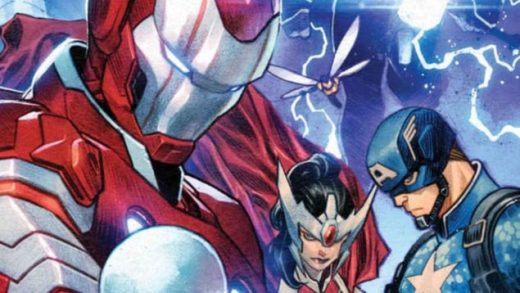It wasn’t until I went to group therapy that I really understood the power of finding solidarity and understanding with other members of the mentally ill community. Mental health memoirs offer an eye-opening look at the lives of the mentally ill and those around them. These works of narrative medicine allow others with similar challenges to say, “That’s exactly how I feel,” a powerful connection through representation when these conditions can be so isolating. These accounts can be harrowing, but almost always offer comfort and education. Memoirs of mental health and addiction can also fill in the gaps of knowledge that those on the outside need to relate to those struggling with mental illness and addiction. This list of the 50 best mental health and addiction memoirs encompasses a wide scope of diagnoses, functionality, and experiences as diverse as the spectrum of mental illness.
Descriptions graciously supplied from publisher descriptions and condensed when necessary.
Agorafabulous! by Sara Benincasa
“Comedian, writer, blogger, radio and podcast host, and YouTube sensation, Sara Benincasa bravely and outrageously brings us ‘Dispatches from My Bedroom’ with Agorafabulous! One of the funniest and most poignant books ever written about a mental illness, Agorafabulous! is a hilarious, raw, and unforgettable account of how a terrified young woman, literally trapped by her own imagination, evolved into a (relatively) high-functioning professional smartass.” (Amazon)
The Body Papers by Grace Talusan
“Winner of The Restless Books Prize for New Immigrant Writing, Grace Talusan’s memoir The Body Papers bravely explores her experiences with sexual abuse, depression, cancer, and life as a Filipino immigrant, supplemented with government documents, medical records, and family photos.” (Amazon)
Brain on Fire: My Month of Madness by Susannah Cahalan
“…Brain on Fire is the powerful account of one woman’s struggle to recapture her identity.
When twenty-four-year-old Susannah Cahalan woke up alone in a hospital room, strapped to her bed and unable to move or speak, she had no memory of how she’d gotten there. Days earlier, she had been on the threshold of a new, adult life: at the beginning of her first serious relationship and a promising career at a major New York newspaper. Now she was labeled violent, psychotic, a flight risk. What happened?
In a swift and breathtaking narrative, Susannah tells the astonishing true story of her descent into madness, her family’s inspiring faith in her, and the lifesaving diagnosis that nearly didn’t happen.” (Amazon)
The Buddha and the Borderline by Kiera Van Gelder
“Kiera Van Gelder’s first suicide attempt at the age of twelve marked the onset of her struggles with drug addiction, depression, post-traumatic stress, self-harm, and chaotic romantic relationships-all of which eventually led to doctors’ belated diagnosis of borderline personality disorder twenty years later.
The Buddha and the Borderline is a window into this mysterious and debilitating condition, an unblinking portrayal of one woman’s fight against the emotional devastation of borderline personality disorder. This haunting, intimate memoir chronicles both the devastating period that led to Kiera’s eventual diagnosis and her inspirational recovery through therapy, Buddhist spirituality, and a few online dates gone wrong. Kiera’s story sheds light on the private struggle to transform suffering into compassion for herself and others, and is essential reading for all seeking to understand what it truly means to recover and reclaim the desire to live.” (Amazon)
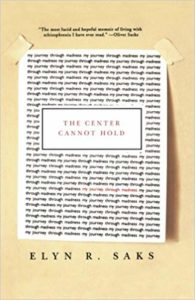 The Center Cannot Hold: My Journey Through Madness by Elyn R. Saks
The Center Cannot Hold: My Journey Through Madness by Elyn R. Saks
“Elyn R. Saks is an esteemed professor, lawyer, and psychiatrist and is the Orrin B. Evans Professor of Law, Psychology, Psychiatry, and the Behavioral Sciences at the University of Southern California Law School, yet she has suffered from schizophrenia for most of her life, and still has ongoing major episodes of the illness.
The Center Cannot Hold is the eloquent, moving story of Elyn’s life, from the first time that she heard voices speaking to her as a young teenager, to attempted suicides in college, through learning to live on her own as an adult in an often terrifying world. Saks discusses frankly the paranoia, the inability to tell imaginary fears from real ones, the voices in her head telling her to kill herself (and to harm others), as well as the incredibly difficult obstacles she overcame to become a highly respected professional. This beautifully written memoir is destined to become a classic in its genre.” (Amazon)
The Collected Schizophrenias by Esmé Weijun Wang
“An intimate, moving book written with the immediacy and directness of one who still struggles with the effects of mental and chronic illness, The Collected Schizophrenias cuts right to the core. Schizophrenia is not a single unifying diagnosis, and Esmé Weijun Wang writes not just to her fellow members of the “collected schizophrenias” but to those who wish to understand it as well. Opening with the journey toward her diagnosis of schizoaffective disorder, Wang discusses the medical community’s own disagreement about labels and procedures for diagnosing those with mental illness, and then follows an arc that examines the manifestations of schizophrenia in her life. In essays that range from using fashion to present as high-functioning to the depths of a rare form of psychosis, and from the failures of the higher education system and the dangers of institutionalization to the complexity of compounding factors such as PTSD and Lyme disease, Wang’s analytical eye, honed as a former lab researcher at Stanford, allows her to balance research with personal narrative. An essay collection of undeniable power, The Collected Schizophrenias dispels misconceptions and provides insight into a condition long misunderstood.” (Amazon)
The Color of Hope: People of Color Mental Health Narratives edited by Vanessa Hazzard
“The Color of Hope: People of Color Mental Health Narratives is a project that sheds light on mental health in communities of color by sharing stories by those affected by mental illness. By sharing our stories, we open up discussion around the topic and break through stigma and shame. The contributors represent those living with or affected by loved ones with depression, bipolar disorder, borderline personality disorder, post-traumatic stress disorder, schizophrenia, and other conditions. They are men and women, children and adults, political prisoners, college students, politicians, musicians, business people, artists, fathers, mothers, daughters…all of African, Latino, and Asian descent. Their narratives add to the tapestry of the human experience and without them, our history is incomplete.” (Amazon)
Darkness Visible: A Memoir of Madness by William Styron
“A work of great personal courage and a literary tour de force, this bestseller is Styron’s true account of his descent into a crippling and almost suicidal depression. Styron is perhaps the first writer to convey the full terror of depression’s psychic landscape, as well as the illuminating path to recovery.”
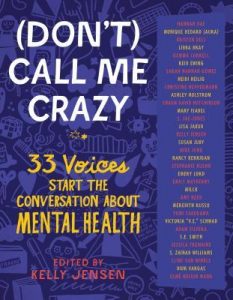 (Don’t) Call Me Crazy: 33 Voices Start the Conversation about Mental Health edited by (Book Riot Editor) Kelly Jensen
(Don’t) Call Me Crazy: 33 Voices Start the Conversation about Mental Health edited by (Book Riot Editor) Kelly Jensen
“To understand mental health, we need to talk openly about it. Because there’s no single definition of crazy, there’s no single experience that embodies it, and the word itself means different things—wild? extreme? disturbed? passionate?—to different people.
In (Don’t) Call Me Crazy, thirty-three actors, athletes, writers, and artists offer essays, lists, comics, and illustrations that explore a wide range of topics: their personal experiences with mental illness, how we do and don’t talk about mental health, help for better understanding how every person’s brain is wired differently, and what, exactly, might make someone crazy.” (Amazon)
Down Came the Rain: My Journey Through Postpartum Depression by Brooke Shields
“In her bestselling memoir, Brooke Shields shares with the world her deeply personal experience with postpartum depression
When Brooke Shields welcomed her newborn daughter to the world, her joyful expectations were quickly followed by something unexpected–a crippling depression. In what is sure to strike a chord with the millions of women who suffer from depression after childbirth, Brooke Shields shares how she, too, battled a condition that is widely misunderstood, despite the fact that it affects many new mothers. She discusses the illness in the context of her life, including her struggle to get pregnant, the high expectations she had for herself and that others placed on her as a new mom, and the role of her husband, friends, and family as she struggled to attain her maternal footing in the midst of a disabling depression.” (Amazon)
Fast Girl: A Life Spent Running from Madness by Suzy Favor Hamilton
“The former middle distance Olympic runner and high-end escort speaks out for the first time about her battle with mental illness, and how mania controlled and compelled her in competition, but also in life. ” (Amazon)
This Fragile Life: A Mother’s Story of a Bipolar Son by Charlotte Pierce-Baker
“Charlotte Pierce-Baker did everything right when raising her son, providing not only emotional support but the best education possible. At age twenty-five, he was pursuing a postgraduate degree and seemingly in control of his life. She never imagined her high-achieving son would wind up handcuffed, dirty, and in jail.
The moving story of an African American family facing the challenge of bipolar disorder, This Fragile Life provides insight into mental disorders as well as family dynamics. Pierce-Baker traces the evolution of her son’s illness and, in looking back, realizes she mistook warning signs for typical child and teen behavior. Hospitalizations, calls in the night, alcohol and drug relapses, pleas for money, and continuous disputes, her son’s journey was long, arduous, and almost fatal. This Fragile Life weaves a fascinating story of mental illness, race, family, the drive of African Americans to succeed, and a mother’s love for her son.” (Amazon)
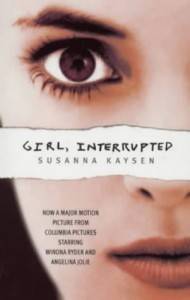 Girl, Interrupted by Susanna Kaysen
Girl, Interrupted by Susanna Kaysen
“In 1967, after a session with a psychiatrist she’d never seen before, eighteen-year-old Susanna Kaysen was put in a taxi and sent to McLean Hospital. She spent most of the next two years in the ward for teenage girls in a psychiatric hospital as renowned for its famous clientele—Sylvia Plath, Robert Lowell, James Taylor, and Ray Charles—as for its progressive methods of treating those who could afford its sanctuary.
Kaysen’s memoir encompasses horror and razor-edged perception while providing vivid portraits of her fellow patients and their keepers. It is a brilliant evocation of a “parallel universe” set within the kaleidoscopically shifting landscape of the late sixties. Girl, Interrupted is a clear-sighted, unflinching document that gives lasting and specific dimension to our definitions of sane and insane, mental illness and recovery.” (Amazon)
Haldol and Hyacinths: A Bipolar Life by Melody Moezzi
“With candor and humor, a manic-depressive Iranian-American Muslim woman chronicles her experiences with both clinical and cultural bipolarity.
Born to Persian parents at the height of the Islamic Revolution and raised amid a vibrant, loving, and gossipy Iranian diaspora in the American heartland, Melody Moezzi was bound for a bipolar life. At 18, she began battling a severe physical illness, and her community stepped up, filling her hospital rooms with roses, lilies and hyacinths.
But when she attempted suicide and was diagnosed with bipolar disorder, there were no flowers. Despite several stays in psychiatric hospitals, bombarded with tranquilizers, mood-stabilizers, and anti-psychotics, she was encouraged to keep her illness a secret—by both her family and an increasingly callous and indifferent medical establishment. Refusing to be ashamed or silenced, Moezzi became an outspoken advocate, determined to fight the stigma surrounding mental illness and reclaim her life along the way.
Both an irreverent memoir and a rousing call to action, Haldol and Hyacinths is the moving story of a woman who refused to become a victim. Moezzi reports from the frontlines of an invisible world, as seen through a unique and fascinating cultural lens. A powerful, funny, and moving narrative, Haldol and Hyacinths is a tribute to the healing power of hope and humor.” (Amazon)
Heart Berries: A Memoir by Terese Marie Mailhot
“Heart Berries is a powerful, poetic memoir of a woman’s coming of age on the Seabird Island Band in the Pacific Northwest. Having survived a profoundly dysfunctional upbringing only to find herself hospitalized and facing a dual diagnosis of post traumatic stress disorder and bipolar II disorder; Terese Marie Mailhot is given a notebook and begins to write her way out of trauma. The triumphant result is Heart Berries, a memorial for Mailhot’s mother, a social worker and activist who had a thing for prisoners; a story of reconciliation with her father―an abusive drunk and a brilliant artist―who was murdered under mysterious circumstances; and an elegy on how difficult it is to love someone while dragging the long shadows of shame.
Mailhot trusts the reader to understand that memory isn’t exact, but melded to imagination, pain, and what we can bring ourselves to accept. Her unique and at times unsettling voice graphically illustrates her mental state. As she writes, she discovers her own true voice, seizes control of her story, and, in so doing, reestablishes her connection to her family, to her people, and to her place in the world.” (Amazon)
Heavy: An American Memoir by Kiese Laymon
“In Heavy, Laymon writes eloquently and honestly about growing up a hard-headed black son to a complicated and brilliant black mother in Jackson, Mississippi. From his early experiences of sexual violence, to his suspension from college, to time in New York as a college professor, Laymon charts his complex relationship with his mother, grandmother, anorexia, obesity, sex, writing, and ultimately gambling. Heavy is a ‘gorgeous, gutting…generous’ (The New York Times) memoir that combines personal stories with piercing intellect to reflect both on the strife of American society and on Laymon’s experiences with abuse. By attempting to name secrets and lies he and his mother spent a lifetime avoiding, he asks us to confront the terrifying possibility that few in this nation actually know how to responsibly love, and even fewer want to live under the weight of actually becoming free.” (Amazon)
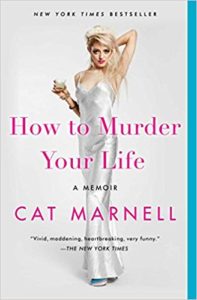 How to Murder Your Life by Cat Marnell
How to Murder Your Life by Cat Marnell
“From the New York Times bestselling author and former beauty editor Cat Marnell, a “vivid, maddening, heartbreaking, very funny, chaotic” (The New York Times) memoir of prescription drug addiction and self-sabotage, set in the glamorous world of fashion magazines and downtown nightclubs.
At twenty-six, Cat Marnell was an associate beauty editor at Lucky, one of the top fashion magazines in America—and that’s all most people knew about her. But she hid a secret life. She was a prescription drug addict. She was also a “doctor shopper” who manipulated Upper East Side psychiatrists for pills, pills, and more pills; a lonely bulimic who spent hundreds of dollars a week on binge foods; a promiscuous party girl who danced barefoot on banquets; a weepy and hallucination-prone insomniac who would take anything—anything—to sleep.
This is a tale of self-loathing, self-sabotage, and yes, self-tanner. It begins at a posh New England prep school—and with a prescription for the Attention Deficit Disorder medication Ritalin. It continues to New York, where we follow Marnell’s amphetamine-fueled rise from intern to editor through the beauty departments of NYLON, Teen Vogue, Glamour, and Lucky. We see her fight between ambition and addiction and how, inevitably, her disease threatens everything she worked so hard to achieve. From the Condé Nast building to seedy nightclubs, from doctors’ offices and mental hospitals, Marnell “treads a knife edge between glamorizing her own despair and rendering it with savage honesty.…with the skill of a pulp novelist” (The New York Times Book Review) what it is like to live in the wild, chaotic, often sinister world of a young female addict who can’t say no.” (Amazon)
Hunger: A Memoir of (My) Body by Roxane Gay
“New York Times bestselling author Roxane Gay has written with intimacy and sensitivity about food and bodies, using her own emotional and psychological struggles as a means of exploring our shared anxieties over pleasure, consumption, appearance, and health. As a woman who describes her own body as “wildly undisciplined,” Roxane understands the tension between desire and denial, between self-comfort and self-care. In Hunger, she casts an insightful and critical eye on her childhood, teens, and twenties—including the devastating act of violence that acted as a turning point in her young life—and brings readers into the present and the realities, pains, and joys of her daily life.
With the bracing candor, vulnerability, and authority that have made her one of the most admired voices of her generation, Roxane explores what it means to be overweight in a time when the bigger you are, the less you are seen. Hunger is a deeply personal memoir from one of our finest writers, and tells a story that hasn’t yet been told but needs to be.” (Amazon)
Irritable Hearts: A PTSD Love Story by Mac McClelland
“When thirty-year-old, award-winning human rights journalist Mac McClelland left Haiti after reporting on the devastating earthquake of 2010, she never imagined how the assignment would irrevocably affect her own life. Back home in California, McClelland cannot stop reliving vivid scenes of violence. She is plagued by waking terrors, violent fantasies, and crippling emotional breakdowns. She can’t sleep or stop crying. Her life in shambles, it becomes clear that she is suffering from Post-Traumatic Stress Disorder. Her bewilderment about this sudden loss of control is magnified by the intensity of her feelings for Nico, a French soldier she met in Port-au-Prince and with whom she connected instantly and deeply.
With inspiring fearlessness, McClelland tackles perhaps her most harrowing assignment to date: investigating the damage in her own mind and repairing her broken psyche. She begins to probe the depths of her illness, exploring our culture’s history with PTSD, delving into the latest research by the country’s top scientists and therapists, and spending time with veterans and their families. McClelland discovers she is far from alone: while we frequently associate PTSD with wartime combat, it is more often caused by other manner of trauma and can even be contagious-close proximity to those afflicted can trigger its symptoms. As she confronts the realities of her diagnosis, she opens up to the love that seems to have found her at an inopportune moment.” (Amazon)
Just Like Someone Without Mental Illness Only More So by Mark Vonnegut, M.D.
“More than thirty years after the publication of his acclaimed memoir The Eden Express, Mark Vonnegut continues his story in this searingly funny, iconoclastic account of coping with mental illness, finding his calling, and learning that willpower isn’t nearly enough.
Here is Mark’s life childhood as the son of a struggling writer, as well as the world after Mark was released from a mental hospital. At the late age of twenty-eight and after nineteen rejections, he is finally accepted to Harvard Medical School, where he gains purpose, a life, and some control over his condition. There are the manic episodes, during which he felt burdened with saving the world, juxtaposed against the real-world responsibilities of running a pediatric practice.
Ultimately a tribute to the small, daily, and positive parts of a life interrupted by bipolar disorder, Just Like Someone Without Mental Illness Only More So is a wise, unsentimental, and inspiring book that will resonate with generations of readers.” (Amazon)
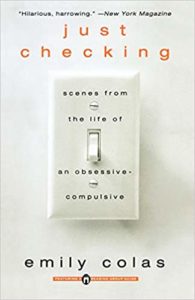 Just Checking: Scenes from the Life of an Obsessive Compulsive by Emily Colas
Just Checking: Scenes from the Life of an Obsessive Compulsive by Emily Colas
“This raw, darkly comic series of astonishing vignettes is Emily Colas’ achingly honest chronicle of her twisted journey through the obsessive-compulsive disorder that came to dominate her world. In the beginning it was germs and food. By the time she faced the fact that she was really ‘losing it,’ Colas had become a slave to her own ‘hobbies’ — from the daily hair cutting to incessant inspections of her children’s clothing for bloodstains.
A shocking, hilarious, enormously appealing account of a young woman struggling to gain control of her life, this is Emily Colas’ exposé of a soul tormented, but balanced by a buoyance of spirit and a piercing sense of humor that may be her saving grace.” (Amazon)
A Kind of Mirraculas Paradise by Sandra Allen
“Writer Sandra Allen did not know their uncle Bob very well. As a child, Sandy had been told Bob was ‘crazy,’ that he had spent time in mental hospitals while growing up in Berkeley in the 60s and 70s. But Bob had lived a hermetic life in a remote part of California for longer than Sandy had been alive, and what little Sandy knew of him came from rare family reunions or odd, infrequent phone calls. Then in 2009 Bob mailed Sandy his autobiography. Typewritten in all caps, a stream of error-riddled sentences over sixty, single-spaced pages, the often-incomprehensible manuscript proclaimed to be a ‘true story’ about being ‘labeled a psychotic paranoid schizophrenic,’ and arrived with a plea to help him get his story out to the world.
In A Kind of Mirraculas Paradise: A True Story about Schizophrenia, Sandy translates Bob’s autobiography, artfully creating a gripping coming-of-age story while sticking faithfully to the facts as he shared them. Lacing Bob’s narrative with chapters providing greater contextualization, Sandy also shares background information about their family, the culturally explosive time and place of their uncle’s formative years, and the vitally important questions surrounding schizophrenia and mental healthcare in America more broadly. The result is a heartbreaking and sometimes hilarious portrait of a young man striving for stability in his life as well as his mind, and an utterly unique lens into an experience that, to most people, remains unimaginable.” (Amazon)
Lights On, Rats Out by Cree LeFavour
“As a young college graduate a year into treatment with a psychiatrist, Cree LeFavour began to organize her days around the cruel, compulsive logic of self-harm: with each newly lit cigarette, the world would drop away as her focus narrowed on the blooming release of pleasure-pain as the burning tip was applied to an unblemished patch of skin. Her body was a canvas of cruelty; each scar a mark of pride and shame.
In sharp and shocking language, Lights On, Rats Out brings us closely into these years. We see the world as Cree did―turned upside down, the richness of life muted and dulled, its pleasures perverted. The heady thrill of meeting with her psychiatrist, Dr. Adam N. Kohl―whose relationship with Cree is at once sustaining and paralyzing―comes to be the only bright spot in her days.
Lights On, Rats Out describes a fiercely smart and independent woman’s charged attachment to a mental health professional and the dangerous compulsion to keep him in her life at all costs.” (Amazon)
Lit by Mary Karr
“Lit follows the self-professed blackbelt sinner, Mary Karr’s descent into the inferno of alcoholism and madness–and to her astonishing resurrection. Karr’s longing for a solid family seems secure when her marriage to a handsome, Shakespeare-quoting blueblood poet produces a son they adore. But she can’t outrun her apocalyptic past. She drinks herself into the same numbness that nearly devoured her charismatic but troubled mother, reaching the brink of suicide. A hair-raising stint in ‘The Mental Marriott,’ with an oddball tribe of gurus and saviors, awakens her to the possibility of joy and leads her to an unlikely faith. Not since Saint Augustine cried, ‘Give me chastity, Lord-but not yet!’ has a conversion story rung with such dark hilarity. Lit is about getting drunk and getting sober, becoming a mother by letting go of a mother, learning to write by learning to live. Written with Karr’s relentless honesty, unflinching self-scrutiny, and irreverent, lacerating humor, it is a truly electrifying story of how to grow up–as only Mary Karr can tell it.” (Amazon)
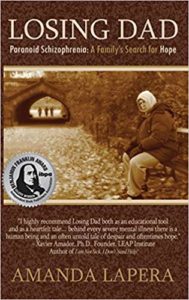 Losing Dad, Paranoid Schizophrenia: A Family’s Search for Hope by Amanda LaPera
Losing Dad, Paranoid Schizophrenia: A Family’s Search for Hope by Amanda LaPera
“Silver Award recipient of IBPA’s prestigious Benjamin Franklin book award in the category of psychology, Losing Dad, Paranoid Schizophrenia: A Family’s Search for Hope is the compelling true story of a family’s struggle with the sudden onset of their father’s severe mental illness. The wife, children, and extended family of ‘Joseph,’ lacking an understanding of his condition, are left to deal with his upsetting transformation. The perspectives of his three children, his spouse, and his own distorted reality combine to offer readers a glimpse of a world that will either feel hauntingly familiar or mind-boggling.
Losing Dad poignantly shows the effects of inadequate treatment for those living with a severe mental illness in America.” (Amazon)
Loud in the House of Myself: Memoir of a Strange Girl by Stacy Pershall
“Stacy Pershall grew up as an overly intelligent, depressed, deeply strange girl in Prairie Grove, Arkansas, population 1,000. From her days as a thirteen-year-old Jesus freak through her eventual diagnosis of bipolar disorder and borderline personality disorder, this spirited memoir chronicles Pershall’s journey through hell and her struggle with the mental health care system.” (Amazon)
The Man Who Couldn’t Stop: OCD and the True Story of a Life Lost in Thought by David Adam
“David Adam―an editor at Nature and an accomplished science writer―has suffered from obsessive-compulsive disorder for twenty years, and The Man Who Couldn’t Stop is his unflinchingly honest attempt to understand the condition and his experiences. In this riveting and intimate blend of science, history, and memoir, Adam explores the weird thoughts that exist within every mind and explains how they drive millions of us toward obsession and compulsion. Told with fierce clarity, humor, and urgent lyricism, The Man Who Couldn’t Stop is a haunting story of a personal nightmare that shines a light into the darkest corners of our minds.” (Amazon)
Manic: A Memoir by Terri Cheney
“On the outside, Terri Cheney was a highly successful, attractive Beverly Hills entertainment lawyer. But behind her seemingly flawless façade lay a dangerous secret—for the better part of her life Cheney had been battling debilitating bipolar disorder and concealing a pharmacy’s worth of prescriptions meant to stabilize her moods and make her ‘normal.’
In bursts of prose that mirror the devastating highs and extreme lows of her illness, Cheney describes her roller-coaster life with shocking honesty—from glamorous parties to a night in jail; from flying fourteen kites off the edge of a cliff in a thunderstorm to crying beneath her office desk; from electroshock therapy to a suicide attempt fueled by tequila and prescription painkillers.
With Manic, Cheney gives voice to the unarticulated madness she endured. The clinical terms used to describe her illness were so inadequate that she chose to focus instead on her own experience, in her words, ‘on what bipolar disorder felt like inside my own body.’ Here the events unfold episodically, from mood to mood, the way she lived and remembers life. In this way the reader is able to viscerally experience the incredible speeding highs of mania and the crushing blows of depression, just as Cheney did. Manic does not simply explain bipolar disorder—it takes us in its grasp and does not let go.” (Amazon)
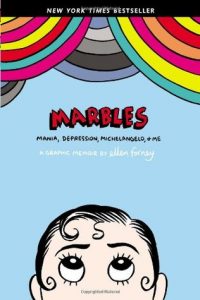 Marbles: Mania, Depression, Michelangelo, and Me: A Graphic Memoir by Ellen Forney
Marbles: Mania, Depression, Michelangelo, and Me: A Graphic Memoir by Ellen Forney
“Shortly before her thirtieth birthday, Forney was diagnosed with bipolar disorder. Flagrantly manic and terrified that medications would cause her to lose creativity, she began a years-long struggle to find mental stability while retaining her passions and creativity.
Searching to make sense of the popular concept of the crazy artist, she finds inspiration from the lives and work of other artists and writers who suffered from mood disorders, including Vincent van Gogh, Georgia O’Keeffe, William Styron, and Sylvia Plath. She also researches the clinical aspects of bipolar disorder, including the strengths and limitations of various treatments and medications, and what studies tell us about the conundrum of attempting to “cure” an otherwise brilliant mind.
Darkly funny and intensely personal, Forney’s memoir provides a visceral glimpse into the effects of a mood disorder on an artist’s work, as she shares her own story through bold black-and-white images and evocative prose.” (Amazon)
Mean by Myriam Gurba
“True crime, memoir, and ghost story, Mean is the bold and hilarious tale of Myriam Gurba’s coming of age as a queer, mixed-race Chicana. Blending radical formal fluidity and caustic humor, Gurba takes on sexual violence, small towns, and race, turning what might be tragic into piercing, revealing comedy. This is a confident, intoxicating, brassy book that takes the cost of sexual assault, racism, misogyny, and homophobia deadly seriously.” (Amazon)
Mental: Lithium, Love, and Losing My Mind by Jamie Lowe
“It began in Los Angeles in 1993, when Jaime Lowe was just sixteen. She stopped sleeping and eating, and began to hallucinate—demonically cackling Muppets, faces lurking in windows, Michael Jackson delivering messages from the Neverland Underground. Lowe wrote manifestos and math equations in her diary, and drew infographics on her bedroom wall. Eventually, hospitalized and diagnosed as bipolar, she was prescribed a medication that came in the form of three pink pills—lithium.
In Mental, Lowe shares and investigates her story of episodic madness, as well as the stability she found while on lithium. She interviews scientists, psychiatrists, and patients to examine how effective lithium really is and how its side effects can be dangerous for long-term users—including Lowe, who after twenty years on the medication suffers from severe kidney damage. Mental is eye-opening and powerful, tackling an illness and drug that has touched millions of lives and yet remains shrouded in social stigma.” (Amazon)
My Age of Anxiety: Fear, Hope, Dread, and the Search for Peace of Mind by Scott Stossel
“Drawing on his own longstanding battle with anxiety, Scott Stossel presents a moving and revelatory account of a condition that affects some 40 million Americans. Stossel offers an intimate and authoritative history of efforts by scientists, philosophers, and writers to understand anxiety. We discover the well-known who have struggled with the condition, as well as the afflicted generations of Stossel’s own family. Revealing anxiety’s myriad manifestations and the anguish it causes, he also surveys the countless psychotherapies, medications, and often outlandish treatments that have been developed to relieve it.
Stossel vividly depicts anxiety’s human toll—its crippling impact, its devastating power to paralyze. He also explores how individual sufferers—including himself—have managed and controlled symptoms. By turns erudite and compassionate, amusing and inspirational, My Age of Anxiety is the essential account of a pervasive and too often misunderstood affliction.” (Amazon)
 My Body is a Book of Rules by Elissa Washuta
My Body is a Book of Rules by Elissa Washuta
“As Elissa Washuta makes the transition from college kid to independent adult, she finds herself overwhelmed by the calamities piling up in her brain. When her mood-stabilizing medications aren’t threatening her life, they’re shoving her from depression to mania and back in the space of an hour. Her crisis of American Indian identity bleeds into other areas of self-doubt; mental illness, sexual trauma, ethnic identity, and independence become intertwined. Sifting through the scraps of her past in seventeen formally inventive chapters, Washuta aligns the strictures of her Catholic school education with Cosmopolitan’s mandates for womanhood, views memories through the distorting lens of Law & Order: Special Victims Unit, and contrasts her bipolar highs and lows with those of Britney Spears and Kurt Cobain. Built on the bones of fundamental identity questions as contorted by a distressed brain, My Body Is a Book of Rules pulls no punches in its self-deprecating and ferocious look at human fallibility.” (Amazon)
My Lesbian Experience with Loneliness by Nagata Kabi
“My Lesbian Experience with Loneliness is an honest and heartfelt look at one young woman’s exploration of her sexuality, mental well-being, and growing up in our modern age. Told using expressive artwork that invokes both laughter and tears, this moving and highly entertaining single volume depicts not only the artist’s burgeoning sexuality, but many other personal aspects of her life that will resonate with readers.” (Amazon)
The Noonday Demon: An Atlas of Depression by Andrew Solomon
“The Noonday Demon examines depression in personal, cultural, and scientific terms. Drawing on his own struggles with the illness and interviews with fellow sufferers, doctors and scientists, policy makers and politicians, drug designers, and philosophers, Andrew Solomon reveals the subtle complexities and sheer agony of the disease as well as the reasons for hope. He confronts the challenge of defining the illness and describes the vast range of available medications and treatments, and the impact the malady has on various demographic populations—around the world and throughout history. He also explores the thorny patch of moral and ethical questions posed by biological explanations for mental illness. With uncommon humanity, candor, wit and erudition, award-winning author Solomon takes readers on a journey of incomparable range and resonance into the most pervasive of family secrets. His contribution to our understanding not only of mental illness but also of the human condition is truly stunning.” (Amazon)
Not All Black Girls Know How to Eat: A Memoir of Bulimia by Stephanie Covington Armstrong
“Stephanie Covington Armstrong does not fit the stereotype of a woman with an eating disorder. She grew up poor and hungry in the inner city. Foster care, sexual abuse, and overwhelming insecurity defined her early years. But the biggest difference is her race: Stephanie is black.
In this moving first-person narrative, Armstrong describes her struggle as a black woman with a disorder consistently portrayed as a white woman’s problem. Trying to escape her self-hatred and her food obsession by never slowing down, Stephanie becomes trapped in a downward spiral. Finally, she can no longer deny that she will die if she doesn’t get help, overcome her shame, and conquer her addiction to using food as a weapon against herself.” (Amazon)
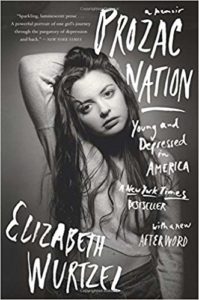 Prozac Nation: Young and Depressed in America by Elizabeth Wurtzel
Prozac Nation: Young and Depressed in America by Elizabeth Wurtzel
“Elizabeth Wurtzel writes with her finger on the faint pulse of an overdiagnosed generation whose ruling icons are Kurt Cobain, Xanax, and pierced tongues. Her famous memoir of her bouts with depression and skirmishes with drugs, Prozac Nation is a witty and sharp account of the psychopharmacology of an era for readers of Girl, Interrupted and Sylvia Plath’s The Bell Jar.” (Amazon)
The Quiet Room: A Journey Out of the Torment of Madness by Lori Schiller and Amanda Bennett
“At seventeen Lori Schiller was the perfect child-the only daughter of an affluent, close-knit family. Six years later she made her first suicide attempt, then wandered the streets of New York City dressed in ragged clothes, tormenting voices crying out in her mind. Lori Schiller had entered the horrifying world of full-blown schizophrenia. She began an ordeal of hospitalizations, halfway houses, relapses, more suicide attempts, and constant, withering despair. But against all odds, she survived.
In this personal account, she tells how she did it, taking us not only into her own shattered world, but drawing on the words of the doctors who treated her and family members who suffered with her.” (Amazon)
Running with Scissors by Augusten Burroughs
“Running with Scissors is the true story of a boy whose mother (a poet with delusions of Anne Sexton) gave him away to be raised by her unorthodox psychiatrist who bore a striking resemblance to Santa Claus. So at the age of twelve, Burroughs found himself amidst Victorian squalor living with the doctor’s bizarre family, and befriending a pedophile who resided in the backyard shed. The story of an outlaw childhood where rules were unheard of, and the Christmas tree stayed up all year round, where Valium was consumed like candy, and if things got dull an electroshock- therapy machine could provide entertainment. The funny, harrowing and bestselling account of an ordinary boy’s survival under the most extraordinary circumstances.” (Amazon)
Shadows in the Sun: Healing from Depression and Finding the Light Within by Gayathri Ramprasad
“A first-of-its-kind, cross-cultural lens to mental illness through the inspiring story of Gayathri’s thirty-year battle with depression. This literary memoir takes readers from her childhood in India where depression is thought to be a curse to life in America where she eventually finds the light within by drawing on both her rich Hindu heritage and Western medicine to find healing.” (Amazon)
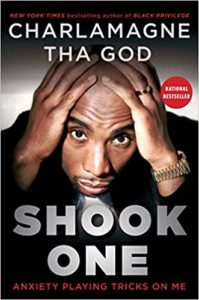 Shook One: Anxiety Playing Tricks on Me by Charlemagne Tha God
Shook One: Anxiety Playing Tricks on Me by Charlemagne Tha God
“Being ‘shook’ is more than a rap lyric for Charlamagne, it’s his mission to overcome. While it may seem like he’s ahead of the game, he is actually plagued by anxieties, such as the fear of losing his roots, the fear of being a bad dad, and the fear of being a terrible husband. Shook One chronicles his journey to beat those fears and shows a path that you too can take to overcome the anxieties that may be holding you back.
Ironically, Charlamagne’s fear of failure—of falling into the life of stagnation or crime that caught up so many of his friends and family in his hometown of Moncks Corner—has been the fuel that has propelled him to success. However, even after achieving national prominence as a radio personality, Charlamagne still found himself paralyzed by anxiety and distrust. Now, in Shook One, he is working through these problems—many of which he traces back to cultural PTSD—with help from mentors, friends, and therapy. Being anxious doesn’t serve the same purpose anymore. Through therapy, he’s figuring out how to get over the irrational fears that won’t take him anywhere positive.
Charlamange hopes Shook One can be a call to action: Getting help is your right. Therapy and showing weakness are not always easy subjects, but if you go to the gym three or four times a week, why can’t you put that same effort and energy into getting mentally strong?” (Amazon)
Sick: A Memoir by Porochista Khakpour
“For as long as author Porochista Khakpour can remember, she has been sick. For most of that time, she didn’t know why. Several drug addictions, some major hospitalizations, and over $100,000 later, she finally had a diagnosis: late-stage Lyme disease.
Sick is Khakpour’s grueling, emotional journey—as a woman, an Iranian-American, a writer, and a lifelong sufferer of undiagnosed health problems—in which she examines her subsequent struggles with mental illness and her addiction to doctor prescribed benzodiazepines, that both aided and eroded her ever-deteriorating physical health. Divided by settings, Khakpour guides the reader through her illness by way of the locations that changed her course—New York, LA, Santa Fe, and a college town in Germany—as she meditates on the physiological and psychological impacts of uncertainty, and the eventual challenge of accepting the diagnosis she had searched for over the course of her adult life.
A story of survival, pain, and transformation, Sick candidly examines the colossal impact of illness on one woman’s life by not just highlighting the failures of a broken medical system but by also boldly challenging our concept of illness narratives.” (Amazon)
Ten Ways Not to Commit Suicide by Darryl McDaniels
“As one third of the legendary rap group Run D.M.C., Darryl ‘DMC’ McDaniels—aka Legendary MC, The Devastating Mic Controller, and the King of Rock—had it all: talent, money, fame, prestige. While hitting #1 on the Billboard charts was exhilarating, the group’s success soon became overwhelming. A creative guy who enjoyed being at home alone or with his family, DMC turned to alcohol to numb himself, a retreat that became an addiction. For years, he went through the motions. But in 1997, when intoxication could no longer keep the pain at bay, he plunged into severe depression and became suicidal. He wasn’t alone. During the same period, suicide became the number three leading cause of death among black people—a health crisis that continues to this day.
In this riveting memoir, DMC speaks openly about his emotional and psychological struggles and the impact on his life, and addresses the many reasons that led him—and thousands of others—to consider suicide. Some of the factors include not being true to who you are, feelings of loneliness, isolation, and alienation, and a lack of understanding and support from friends and family when it’s needed most. He also provides essential information on resources for getting help. Revealing how even the most successful people can suffer from depression, DMC offers inspiration for everyone in pain—information and insight that he hopes can help save other lives.” (Amazon)
This Close to Happy: A Reckoning with Depression by Daphne Merkin
“‘Despair is always described as dull,’ writes Daphne Merkin, ‘when the truth is that despair has a light all its own, a lunar glow, the color of mottled silver.’ This Close to Happy―Merkin’s rare, vividly personal account of what it feels like to suffer from clinical depression―captures this strange light.
Daphne Merkin has been hospitalized three times: first, in grade school, for childhood depression; years later, after her daughter was born, for severe postpartum depression; and later still, after her mother died, for obsessive suicidal thinking. Recounting this series of hospitalizations, as well as her visits to myriad therapists and psychopharmacologists, Merkin fearlessly offers what the child psychiatrist Harold Koplewicz calls ‘the inside view of navigating a chronic psychiatric illness to a realistic outcome.’ The arc of Merkin’s affliction is lifelong, beginning in a childhood largely bereft of love and stretching into the present, where Merkin lives a high-functioning life and her depression is manageable, if not ‘cured.’ ‘The opposite of depression,’ she writes with characteristic insight, ‘is not a state of unimaginable happiness . . . but a state of relative all-right-ness.’
In this dark yet vital memoir, Merkin describes not only the harrowing sorrow that she has known all her life, but also her early, redemptive love of reading and gradual emergence as a writer. Written with an acute understanding of the ways in which her condition has evolved as well as affected those around her, This Close to Happy is an utterly candid coming-to-terms with an illness that many share but few talk about, one that remains shrouded in stigma. In the words of the distinguished psychologist Carol Gilligan, ‘It brings a stunningly perceptive voice into the forefront of the conversation about depression, one that is both reassuring and revelatory.’” (Amazon)
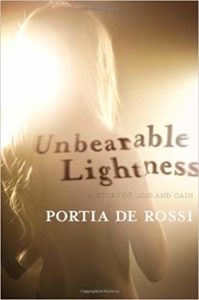 Unbearable Lightness: A Story of Loss and Grief by Portia de Rossi
Unbearable Lightness: A Story of Loss and Grief by Portia de Rossi
“Author Portia de Rossi weighed only 82 pounds when she collapsed on the set of the Hollywood film in which she was playing her first leading role. This should have the culmination of all her years of hard work – first as a child model in Australia, then as a cast member of one of the hottest shows on American television. On the outside she was thin and blond, glamorous and successful. On the inside, she was literally dying. In this searing, unflinchingly honest book, Portia de Rossi captures the complex emotional truth of what it is like when food, weight, and body image take priority over every other human impulse or action. In this remarkable and beautifully written work, Portia shines a bright light on a dark subject. A crucial book for all those who might sometimes feel at war with themselves or their bodies. Unbearable Lightness is a story that inspires hope and nourishes the spirit.” (Amazon)
Unholy Ghosts: Writers on Depression edited by Nell Casey
“Unholy Ghost is a unique collection of essays about depression that, in the spirit of William Styron’s Darkness Visible, finds vivid expression for an elusive illness suffered by more than one in five Americans today. Unlike any other memoir of depression, however, Unholy Ghost includes many voices and depicts the most complete portrait of the illness. Lauren Slater eloquently describes her own perilous experience as a pregnant woman on antidepressant medication. Susanna Kaysen, writing for the first time about depression since Girl, Interrupted, criticizes herself and others for making too much of the illness. Larry McMurtry recounts the despair that descended after his quadruple bypass surgery. Meri Danquah describes the challenges of racism and depression. Ann Beattie sees melancholy as a consequence of her writing life. And Donald Hall lovingly remembers the “moody seesaw” of his relationship with his wife, Jane Kenyon.” (Amazon)
An Unquiet Mind: A Memoir of Moods and Madness by Kay Redfield Jamison
“In her bestselling classic, An Unquiet Mind, Kay Redfield Jamison changed the way we think about moods and madness.
Dr. Jamison is one of the foremost authorities on manic-depressive (bipolar) illness; she has also experienced it firsthand. For even while she was pursuing her career in academic medicine, Jamison found herself succumbing to the same exhilarating highs and catastrophic depressions that afflicted many of her patients, as her disorder launched her into ruinous spending sprees, episodes of violence, and an attempted suicide.
Here Jamison examines bipolar illness from the dual perspectives of the healer and the healed, revealing both its terrors and the cruel allure that at times prompted her to resist taking medication. An Unquiet Mind is a memoir of enormous candor, vividness, and wisdom—a deeply powerful book that has both transformed and saved lives.” (Amazon)
Wasted: A Memoir of Anorexia and Bulimia by Marya Hornbacher
“Precociously intelligent, imaginative, energetic and ambitious, Marya Hornbacher grew up in a comfortable middle-class American home. At the age of five, she returned from a ballet class one day, put on an enormous sweater, curled up on her bed and cried — because she thought she was fat. By age nine, she was secretly bulimic, throwing up at home after school while watching The Brady Bunch reruns on television and munching Fritos. She added anorexia to her repertoire a few years later and took great pride in her ability to starve.
Why would a talented young girl go through the looking glass and step into a netherworld where up is down and food is greed, where death is honor and flesh is weak? Why enter into a love affair with hunger, drugs, sex and death? Marya Hornbacher sustained both anorexia and bulimia through five lengthy hospitalizations, endless therapy, the loss of family, friends, jobs and, ultimately, any sense of what it meant to be “normal.” In this vivid, emotionally wrenching memoir, she re-creates the experience and illuminates the tangle of personal, family and cultural causes that underlie eating disorders.”
What Becomes of the Brokenhearted by E. Lynn Harris
“In many ways writing saved my life. It’s my hope that sharing my experience will give hope to others who are learning to deal with their “difference.” I want them to know they don’t have to live their lives in a permanent “don’t ask, don’t tell” existence. Truth is a powerful tool.
“But my hope for this book doesn’t stop there. I think there is a message here for anyone who has ever suffered from a lack of self-esteem, felt the pain of loneliness, or sought love in all the wrong places. The lessons I have learned are not limited to race, gender, or sexual orientation. Anyone can learn from my journey. Anyone can overcome a broken heart.”–E. Lynn Harris (Amazon)
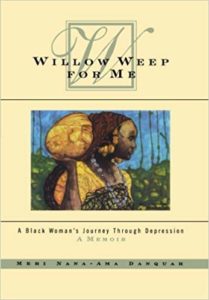 Willow Weep for Me: A Black Woman’s Journey Through Depression by Meri Nana-Ama Danquah
Willow Weep for Me: A Black Woman’s Journey Through Depression by Meri Nana-Ama Danquah
“This moving memoir of an African-American woman’s lifelong fight to identify and overcome depression offers an inspirational story of healing and emergence. Wrapped within Danquah’s engaging account of this universal affliction is rare and insightful testimony about what it means to be black, female, and battling depression in a society that often idealizes black women as strong, nurturing caregivers. A startlingly honest, elegantly rendered depiction of depression, Willow Weep for Me calls out to all women who suffer in silence with a life-affirming message of recovery. Meri Danquah rises from the pages, a true survivor, departing a world of darkness and reclaiming her life.” (Goodreads)




